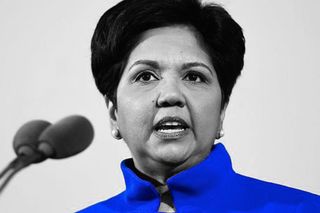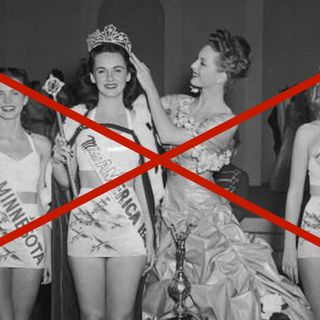
Controversial Crush: Indra Nooyi
The American Dream comes at a price.

In the series Controversial Crush, we dote on controversial women and tell you why.
In college, during a semester when I was particularly motivated, I Googled an image of Indra Nooyi, printed it out, and pinned it to my cork board calendar. I think I hoped she would remind me that if I just finished all my reading, I, too, could become the CEO of PepsiCo one day.
Nooyi’s story seemed like textbook inspiration. After persuading her conservative Tamil parents to let her leave India, she arrived in the United States in her 20s to attend Yale School of Management. In addition to attending classes during the day, she worked a full night shift as a receptionist to support herself. Years down the line, after becoming CEO of PepsiCo, Nooyi gave an interview saying she only got four hours of sleep a night. When I felt overwhelmed balancing classes, extracurriculars, and sleep, this story helped keep me on schedule.
In a few months, I abandoned my extremely short-lived dreams of a corporate career, and Nooyi faded into the back crevices of my mind, where she remained for several years. I was only reminded of her last year, when Pepsi came under fire for a tone-deaf Kendall Jenner ad. The ad attempted to ride the wave of modern protest, but managed to glean only its trendiest, whitest aspects and simultaneously offend Black Lives Matter advocates. Pepsi’s failed attempt at relevance was enough for me to, by association, renounce Nooyi as any sort of role model.
After Nooyi made headlines again for saying PepsiCo planned to roll out “Lady Doritos” earlier this year, many have come to see her as a kind of corporate she-devil. I was shocked to hear Nooyi say something so patently sexist. But I was even more shocked to realize I still found her inspirational.
“[Women] don’t like to crunch too loudly in public,” Nooyi said on an episode of Freakonomics Radio in January. “For women, low-crunch, the full taste profile, not have so much of the flavor stick on the fingers, and how can you put it in a purse? Because women love to carry a snack in their purse.”
She never used the phrase “Lady Doritos” herself — that gem was a tabloid addition. It sounds like Nooyi was referring to market research on differences in consumer preference, but because she didn’t mention it specifically, her words came across as a personal assumption that women are too dainty to get crumbs on their fingers. It is undoubtedly problematic, and outdated, for corporations to target consumers based on gendered market research, but Nooyi seems to have taken the brunt of the blame for PepsiCo here — something she often ends up doing.
Nooyi certainly does not appear afraid of going back on what she said when mistakes are made. In a clear course correction, PepsiCo quickly clarified that Doritos are for everyone, and it’s safe to say they’ve probably halted all plans to put “Lady Doritos” on shelves anytime soon. And when the Kendall Jenner ad received backlash, Nooyi was quick to clarify in an interview that she’d never seen the scene with the policeman. “This has pained me a lot because this company is known for diversity, and the fact that everybody who produced the commercial and approved the commercial did not link it to Black Lives Matter made me scratch my head,” she said. Of course, it’s part of her job as CEO to take the fall for her company. But not all CEOs — especially not ones at her level — know how to cop to mistakes.
Yet another political snafu in which Nooyi was embroiled was the Strategic and Policy Forum — a council established by the current American president. Serving a man with such a hateful, anti-immigrant platform seems antithetical to what Nooyi should stand for as a first-generation immigrant herself. But perhaps her intentions were admirable. She was only the third woman (and the only woman of color) to be appointed to the council — it’s not impossible that she accepted the invitation because she thought she could be a positive voice.
In fact, she was; it was in part because of her that the council disbanded after President Trump’s noncommittal comments in response to the Charlottesville protest. Nooyi, along with the two other women on the council, was reportedly the driving force behind the council’s decision to disband. “Heartbroken by the violence in #Charlottesville,” Nooyi tweeted. “Hate and intolerance are a betrayal of what we stand for as Americans.”
Of course, it’s likely that PepsiCo made this decision on Nooyi’s behalf. The white supremacist Charlottesville protests happened after the Kendall Jenner debacle. This was an opportune moment for the company to prove its support for the Black Lives Matter movement.
Ultimately, Nooyi is tied to PepsiCo; her personal opinions must remain discrete and discreet if they clash with the corporation’s interests. Occasionally, however, her own convictions become evident — by mistake, and that’s what makes them feel genuine. “Our employees were all crying and the questions that they’re asking, especially those who are not white, ‘Are we safe?’” she said at a an event which took place two days after Trump’s election. “I never thought I’d have to answer those questions.”
These comments put PepsiCo on a list of boycotts carried out by Trump supporters. The company backtracked, issuing an official statement that Nooyi was referring to only a section of PepsiCo workers, not all of them. But Nooyi had made the comments all the same, and because they were against the best interests of her company, her concern felt personal and genuine.
Nooyi is often compared to Facebook COO Sheryl Sandberg, who has been criticized for promoting a deceptively simple narrative of success. But Nooyi is not a white American; she is an immigrant from India. As a first-generation immigrant, Nooyi had to fight tooth and nail to reach the position she currently occupies. For immigrants, hard work is the only path to success, but it’s not simple: Institutional obstacles are simply par for the course. Nooyi managed to blaze a trail no one before her had, rising the ranks of PepsiCo to become its first non-American CEO. One of her first moves as CEO was to restructure PepsiCo in an attempt to make its products healthier, and she has also talked about plans to make the company friendlier for working parents.
Once she reached the top, she continue to face oppression, both racist and sexist in nature (A 2011 New Yorker piece pointing out that she wore saris to work and saying she looks more like a “media executive” than a “food industry chieftain” is just one example). Nooyi’s family life, too, is not without difficulty. She mentioned it was only possible to dedicate herself to her job because her parents live with her and help with child care. But she’s also said that her traditional mother requires her to leave her CEO “crown” at the door so she doesn’t upstage her husband at home. When the interviewer asked if Nooyi’s mother would have said the same thing to a man, Nooyi said no.
Nooyi lives in this tragic, delicate balancing act: her kids don’t think she spends enough time with them, but she still has to downplay her success at home. She has her own moral and political opinions, but they seem to often go against the interests of the company she leads.
She’s made a lot of decisions I personally disagree with as a result of this balancing act, but when it comes down to it, as a woman of color, I’m still inspired by her ambition and perseverance in the face of a litany of institutional obstacles. As Nooyi has said before, women aren’t really able to “have it all.” And immigrants certainly can’t have it all.
When you make the decision to immigrate, particularly as a woman, you sign yourself up to a life of concessions. The American dream comes with a hefty price, and Indra Nooyi has paid it. She may not be an inspirational leader, activist, or parent. But she has indeed laid out a path many immigrants would aspire to follow.
This edition of Controversial Girl Crush comes to you courtesy of UB.
Urvija Banerji is the Features Editor at The Swaddle, and has previously written for Rolling Stone India and Atlas Obscura. When she's not writing, she can be found in her kitchen, painting, cooking, picking fights online, and consuming large amounts of coffee (often concurrently).
Related


“Because I Am a Mother, I Know How it Feels if Anything Happens to a Child.”
